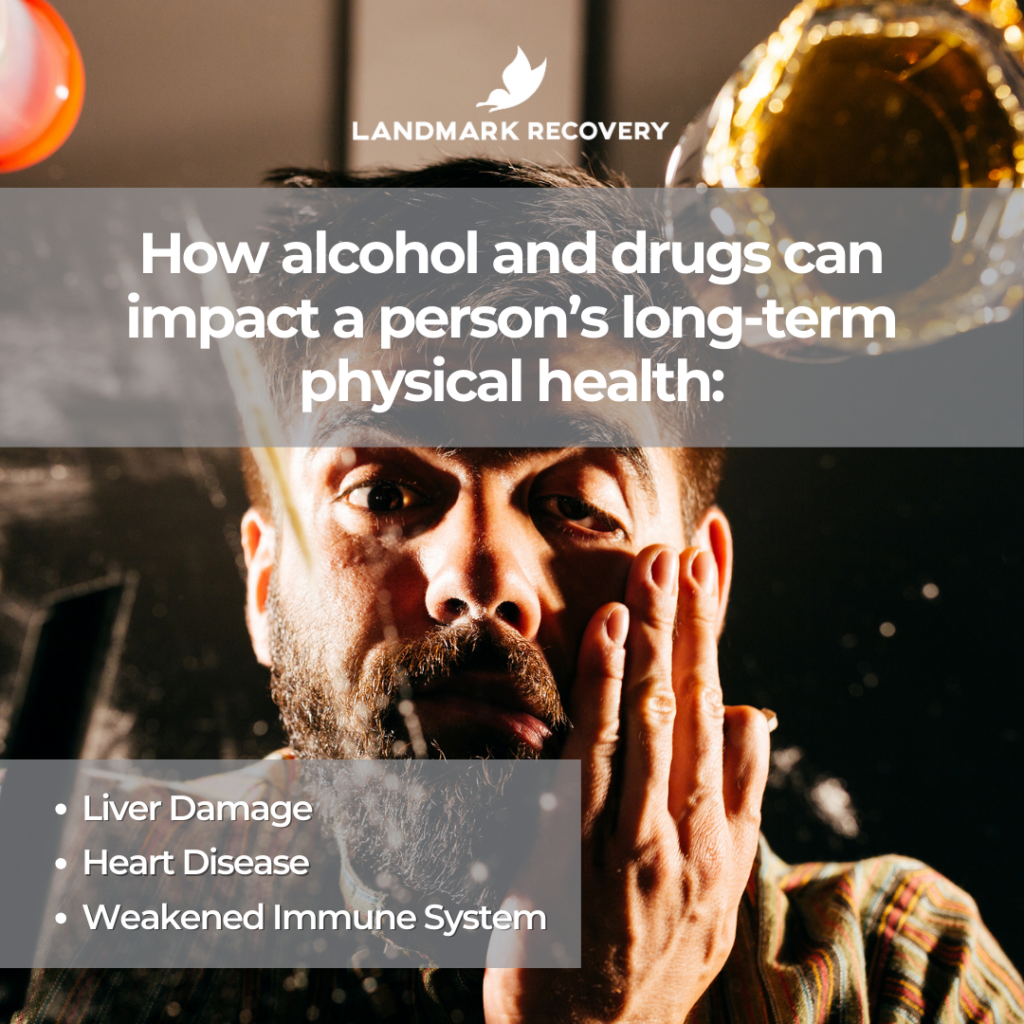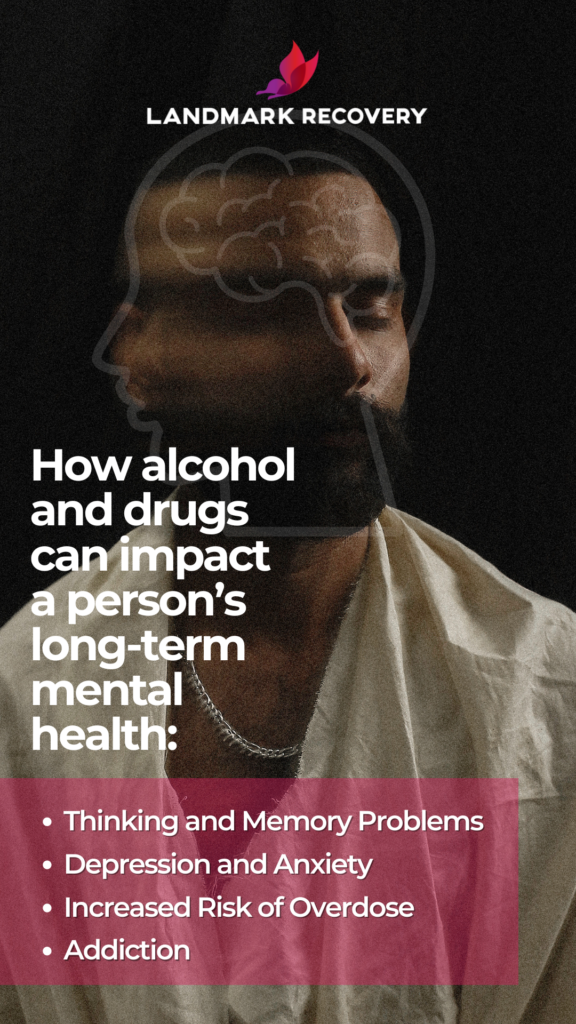Are you aware of the long-term effects of substance abuse? Alcohol and drug use can take a toll on your physical and mental health. Regular substance use can lead to chronic diseases, organ damage and increased risk of mental health disorders like anxiety and depression.
Not only that, but regular substance use can also lead to addiction or a fatal drug overdose.
This blog explores the long-term effects of substance use, how it can impact your health and what you can do to reduce your risk of harm. It’s important to know what could happen to your body and mind before you decide to drink alcohol or use drugs, so you can make smart choices about your overall health and safety.
What Are The Long-Term Effects Of Alcohol And Drugs?
Many people are familiar with the short-term, or immediate, effects of alcohol or drug use, like impaired judgment and coordination from a “hangover” or “high.” However, they may be less aware of the significant long-term impact on a person’s physical and mental health.
Ever wonder why a nasty hangover feels so bad? Blame it on the acetaldehyde! It's a very toxic chemical, and can be more dangerous than alcohol itself. Luckily the body is prepared to get rid of it during the process, which is what causes the hangover itself. pic.twitter.com/KgB1S9UrjH
— Landmark Recovery (@landmarkrecover) August 5, 2021
Physical Health Effects
Here are common examples of how substance use can impact a person’s long-term physical health.
Liver Damage
One of the most significant long-term effects of alcohol and drug use is liver damage. The liver plays a vital role in the body’s metabolism and detoxification processes, which can become severely compromised by prolonged substance use. According to the American Liver Foundation, about 14,000 people in the United States die each year from alcohol-related liver disease. Long-term drug use can also cause liver damage and even liver failure. Injection drug use, in particular, is a major risk factor for viral hepatitis, which can also lead to liver failure, according to the CDC.
Heart Disease
Substance use can lead to heart disease. According to the American Heart Association (AHA), cocaine use can cause heart attacks, even in young people without any prior signs of heart disease. A 2022 study published online in the American Academy of Neurology Journals found that heavy drinking can lead to an increased risk of high blood pressure, stroke and heart failure.
Weakened Immune System
Alcohol and drug use can also weaken the immune system, the body’s natural defense system. That makes people more vulnerable to viral infections and illnesses. For example, hepatitis C virus (HCV) infection is commonly associated with injection drug use. A weakened immune system can also make it difficult for the body to fight off cancerous cells.
This can increase the risk of certain cancers like liver cancer, one of the most common cancers associated with heavy drinking. According to the World Health Organization (WHO), alcohol is the leading risk factor for deaths attributable to liver disease.
Mental Health Effects of Alcohol and Drug Use
Here are some of the most common mental health effects of alcohol and drug use to be aware of.
Thinking and Memory Problems
Drug and alcohol use can damage the way a person’s brain works. That can make it harder to remember things, think clearly or do things you used to be able to do easily. Substance use can also alter a person’s mood and behavior, leading to poor decision-making and impulsive actions.
Depression and Anxiety
Substance use can lead to depression and anxiety, which can persist even after an individual stops using drugs or alcohol. Long-term drug use can also trigger psychosis, a severe mental health condition characterized by delusions and hallucinations. Regular alcohol or drug use may worsen symptoms for people with existing mental health conditions.
Overdose and Addiction
Increased Risk of Overdose
Long-term substance use can increase the risk of overdose, which can be fatal. An overdose occurs when a person consumes too much of a drug or a combination of drugs, leading to respiratory depression and other life-threatening symptoms. A study published in the Journal of Addiction Medicine found that people with a history of repeated drug use were at a higher risk of experiencing an overdose.
Addiction
Using drugs or alcohol regularly can lead to addiction, which is a progressive disease that can be really hard to overcome without professional care. In 2019, over 20 million adults aged 18 or older in the United States were diagnosed with a substance use disorder (SUD), according to the National Survey on Drug Use and Health (NSDUH). Addictions can harm a person’s physical and mental health, causing emotional distress, straining relationships and harming their overall quality of life.
Reducing The Risk of Harm
The long-term effects of alcohol and drug use can be severe and life-altering. However, there are steps you can take to reduce your risk of harming your overall health. Seeking professional help for addiction, practicing harm reduction techniques and taking care of your health can help minimize the long-term consequences of regular substance use.
Key Takeaways
If you or a loved one suffer from the long-term effects of alcohol or drugs, it’s important to seek help immediately. At Landmark Recovery, we understand, however, that seeking help can be difficult, especially due to the negative stigma around alcohol and drugs. Remember, addiction is a disease that requires lifelong support beyond a treatment program.
Seeking help is a brave and necessary step toward long-term recovery. Reach out to a qualified healthcare provider for more information on integrated treatment programs. You’re not alone, and there is hope for a brighter future. Click the button below to verify your insurance or visit our locations page to find a treatment center near you.

Choose Recovery Over Addiction
We're here 24/7 to help you get the care you need to live life on your terms, without drugs or alcohol. Talk to our recovery specialists today and learn about our integrated treatment programs.






